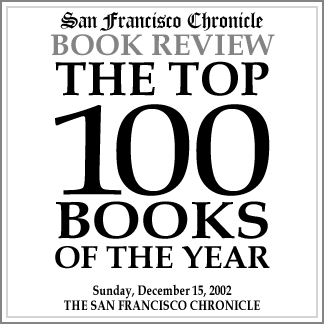|
Carol Muske-Dukes The perennial question, "What does it mean to be a Los Angeles writer?" is one of the many that Carol Muske Dukes explores in her recent collection of essays, "Married to the Icepick Killer: A Poet in Hollywood." Perhaps, when she describes herself as an “internationally unknown author,” she is taking a stab at answering it. Of course, this is an understatement. Muske-Dukes is an accomplished, published novelist and poet who has received many an award and fellowship and is director of the graduate program in literature and creative writing at USC. She is an uncontested linchpin of the literary community in Los Angeles. But compared to the theatrical and celebritv-driven world of her husband, the late actor David Coleman Dukes, it must have felt like taking on the role of an undiscovered starlet, again and again.
The lurid title, reminiscent of "You'll Never Eat Lunch in This Town Again," belies the prose 'within The essays, many of which appeared previously in the New York Times, are decidedly up-market. The themes run the gamut of societal and academic hot-button subjects: the never-ending rant against and appeasement of the constantly changing set of literary' and academic standards in the modern world; a poet's place in politics; politicians, particularly former President Clinton; poetry as a commodity in Hollywood; poetry as fad and marketing tool; and performance poetry, or what she terms "poetry karaoke." She covers a lot of ground in small leaps, but the analysis of poetry, the poems themselves and a poet's craft are at the core of these relatively short pieces. The most inspired moments are those in which Muske-Dukes allows her natural irreverent playfulness to emerge, and usually they are in the context of a spill-the-beans titillating tidbit from her life as a wife to an actor and her status as a sought-after member of the literati. In the essay "Two Poems: East and West, Right and Left - Politics Through The Eyes of Poetry," she de-scribes being invited to the White House for a fancy do honoring poets. There, Clinton recites poetry, relays how poems have instructed him in all matter of political lessons. Muske-Dukes riffs on Shelley's quote that "poets are the unacknowledged legislators of the world" and imagines how a "Poets' Congress would be motley but more eclectically read than any previous legislative body, better at similes (President Yeltsin, you think like a piroshki!), better at the bedrock iambic line ('Whose bill this is I think I know....'), better at imagining authority figures minus their clothes and in patty hats. To prevent filibustering, congressional members would occasionally be required to communicate in haiku.…” Unlike the tell-all tales that fly off the supermarket shelves, Muske-Dukes' gossip has a point, roundabout as the structure of the essays sometimes seems: She tells all in the service of poetry. Her prose is expansive, dreamy, but the slightly curled lip of cynicism is never far from present. Her tone is in turn forceful and forthright, bewildered and tearful, as she confronts the difficult changes in her personal life and the world around her, but her natural cadence is one of temperance. The book is dedicated to the memory of her husband, and the most moving essay "Let Me Play the Lion Too: A Remembrance" recalls his devotion to the art of acting and the theater. The quote "Let me play the lion too" is from "A Midsummer Night's Dream" and speaks of his desire to play every part, like Bottom, wanting to transform the self and regale the audience, the reader." They are also the words inscribed on his gravestone. The juncture at which Hollywood and poets meet, if at all, is usually an awkward one, but for Muske-Dukes It has always been full of the magic of love and now includes the pain of loss. However, to be an L.A. writer, one must be willing to eat lunch in this town on a regular basis, and the chances that Muske-Dukes will continue to do so are very good. As she quotes from Seamus Heaney's "The Cure at Troy": "Suspect too much sweet talk, but never close your mind." Thea Klapwald has written for the (London) Times Literacy Supplement and other publications, and is working on a novel about expatriates living in Hong Kong.
Poet/novelist/critic
Muske-Dukes (Life After Death) here turns to the essay form.
In her introduction, she writes, "It never occurred to me as
I was writing these essays that I was writing, in part, an elegy."
Her husband, actor David Coleman Dukes (who once played an icepick killer),
passed away last year, and many of the essays included are meditations
on the contradictions of their life together. Thus, what is ostensibly
a collection of essays is also an extended love letter. Upon her arrival
in Hollywood, the author was asked what kind of writing she did —"half
hour or hour?"—and was mentioned in Liz Smith's columns.
She uses Hollywood's show business culture as a stepping stone for
ruminations on what it means to be an artist, the significance of
poetry quotations on billboards, and the adjustments made in a marriage
between two artists. Her subjects run the gamut from being invited
to the Clinton White House to lunch with Michelle Pfeifer. Her insights
are acutely observed and often devastatingly funny. Recommended for
libraries with large poetry and film collections.
A writer of depth,
precision, and wit in her poetry and novels, which include Life
After Death [BKL My 1501], Muske-Dukes turns out to be a piquant
essayist, Fascinated with her adopted city, L.A., and the nature of
a "a poet's existence in a city whose main industry is the serious
production of illusion," she assesses Hollywood as a writer,
director of the University of Southern California's graduate writing
program, and wife of actor David Coleman Dukes who died unexpectedly in 2000.
Muske-Dukes' poignant memories of her late husband's love of acting
and language enrich her crisp parsing of poetry's place in today's
noisy, image-saturated world as she imagines John Keats at a poetry
slam, profiles a surfer poet, and describes her attempt to write a
screenplay based on her first novel, which was eagerly optioned by
Michelle Pfeiffer. Smart and ardent, amusing and light on her feet,
Muske-Dukes also squares off against Harold Bloom, and recounts a
surprisingly literary conversation with Bill Clinton, all the while
drawing on the strength and second sight poetry bestows.
Married to the Icepick Killer: A Poet in Hollywood by Carol Muske-Dukes (Random House, 204 pages, $23.95). When actor David Coleman Dukes died Oct. 9, 2000, at 55, he had become virtually ubiquitous, as all good character actors should be. Even though his name, sadly, is almost the same as a vile Louisiana neo-Nazi (the actor's final S marks the only difference), you never knew where David Coleman Dukes would turn up—everything from "Dawson's Creek" to the movie "Gods and Monsters" and most stops in between. What was far from generally known, though, is that the wife of this fastidious and omnipresent classically trained actor was a poet, teacher, novelist and essayist of precise, subtle and deeply intuitive mind who, because of marriage, found herself living in the place generally (if erroneously) assumed to be the congenial of American literary environments: Hollywood, Calif. Not so. Not by a long shot. There are ways, in fact, in which residence inside the film/theater world of Los Angeles is almost ideal for a certain sort of open-minded writer, and anyone with any doubts should read this remarkable essay collection. The title is somewhat misleading. Only a small fraction of it is devoted to domestic and career life with a busy working actor (the title refers to his first film role in Frank Sinatra's TV movie "The First Deadly Sin"; he was also the actor who had the thankless part of Edith Bunker's attempted rapist in "All in the Family"). The rest is about the presumed anomalous existence of a real honest-to-God poet in the world of coastal showbiz (who lives just a stone's throw away from Ellen DeGeneres). She, in fact, becomes a fearsome enclave of clarity whose foot in both worlds enables her to see both with bracing insight. In its quiet and
unassuming way, this book has more to say about the zeitgeist than
a lot of longer, louder books. Two samples: "Hollywood is to
poetry as a massacre is to a small intimate murdered group. Or is
it the other way around?" and , "This is an awkward moment
in history, when we are afraid to admit any view of art that is not
'egalitarian'....Still, who will say it? That what is called elitism
in art often turns out to be art itself. 'Elitism' itself is egalitarian....What
do we need in the arts right now? Great audiences. Reader, thinkers,
resisters of the Bar Code culture. And here's a heresy from the heart:
We do not need more 'community' right now. We need solitary minds
right now and individual reflectiveness, we need silence, the silence
of reading before we turn outward again."
This is a story about a poet who married an actor and brought her sensibility to bear on a world very different, and not so different from her own. On the one hand, "Married to the Icepick Killer" is a wry, witty look at Hollywood, and acting in general filled with apt, telling anecdotes and intelligent analysis. At the same time, it is clear-eyed, penetrating look at the world of poetry: from classroom to the billboard, from West Point to the Clinton White House.
An established academician who teaches creative writing at the University of Southern California, Muske-Dukes is also a poet in her very essence. This enables her to rise above the most ludicrous situation, as in a cocktail party incident, in which the sureness of her identity takes her into choppy waters: "A man asked me what I did for a living, I told him that I was a writer. 'Right,' he said. 'Half-hour or hour?' I smiled indulgently. 'Neither,' I said, fixing him with what I like to think of as an Oversoul gaze. 'Lifetime." He smiled back. 'Oh, you work for cable,' he said." Not all her anecdotes
are as amusing or as pat as this one. Muske-Dukes is a keen observer
of the culture, with a nice sense of its historical evolution - or
decline.
"Married to the Icepick Killer" is a wry, witty look at Hollywood and acting in general, filled with apt, telling anecdotes and intelligent analysis. At the same time, it is a clear-eyed, penetrating look at the world of poetry: from the classroom to the billboard, from West Point to the Clinton White House. Running through the book as well is a moving, elegiac subtheme: a deeply tribute to the author's husband, David Coleman Dukes, whose sudden, premature death at age 55 two years ago ended an impressive stage and screen career. This review also appeared in The San Francisco Chronicle's listing of this years top 100 Books.
These essays are far more serious than the jokey title suggests. The subject here is not primarily being married to movie actor David Coleman Dukes or living in Hollywood (although both of these represent extreme cases of unreality) but of the state of poetry here and now. In her first essay, Muske-Dukes focuses on the huge freeway billboards of Hollywood that have recently started promoting lines from Emily Dickinson, easily confused in Los Angeles with Calvin Klein ad copy. In "U-571:The Silent Screen," she finds herself involved in the filmmaking process itself when a director expressly asks for a poet to write the final for a submarine flick. Although credited as a consultant, she concedes that no poetic words can match the vivid floating world on the screen. She visits the White House, where Clinton recites his favorite verses from Seamus Heaney and reveals that the poetry helped him formulate foreign policy. She teaches engaged cadets at West Point. She takes on Harold Bloom and the Western Canon, applauds Bill Moyers and his "The Language of Life" series. She can be merciless
about Hollywood, a "town where Carrie Fischer is considered a
genius." But in the end, she is affectionate about her hometown.
In her neighborhood, Hancock Park, a very desirable filming location,
production crews arrive to change street signs without warning, to
scatter dead bodies on the pavement in a "small intimate grouping"
("not massacre," she was assured). On the last page, she
asks, "How do words change in the capital city of illusion? Hollywood
is to Poetry as a massacre is to a small intimate murdered group.
Or is it the other way around?" Thank Muske-Dukes for asking
these questions and for remaining in LA to consider the answers.
Intriguing essays about the relationship between art and illusion by a writer in the City of Angeles (Random House, $23.95).
In the 16 essays
collected in "Married to the Icepick Killer," most of them
previously published, Carol Muske-Dukes discusses the nimbus surrounding
poetry: teaching writing and being a witness to the creation of a
poem; attending a poetry evening at the Clinton White House in 1998
and considering the relationship between poetry and politics; remembering
the acting career of her husband, the late David Coleman Dukes, and noting
the connection between writing and acting. (The title refers to Duke's
portrayal of the ice-pick killer in the film "The First Deadly
Sin.") Poet, critic and director of the graduate program in literature
and creative writing at the University of Southern California, Muske-Dukes
writes a playful, discursive style, inserting numerous parenthetical
statements as a running commentary on the text. These asides suggest
her perspective both as a poet, who is able to look at her subject
from the inside out, and as a critic, who can look at a subject from
the outside in. The loose writing is peppered with beside-the-point
data, but is nevertheless interesting, as when Muske-Dukes, thinking
of bad lines from movies, suggests her own favorite, spoken by a woman
who survived the Titanic: "A woman's heart is like an ocean."
|
|||||||||||||||||||||||||||||||||||||||||||||||||
|
||||||||||||||||||||||||||||||||||||||||||||||||||
|
Home | Bio | Channeling Mark Twain | Publications | Fiction | Poetry | Articles | Interview | Reviews | Remembering | Events | Contact
|
||||||||||||||||||||||||||||||||||||||||||||||||||
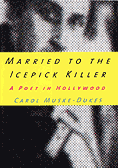

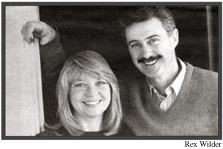



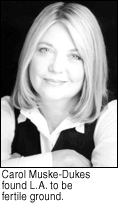
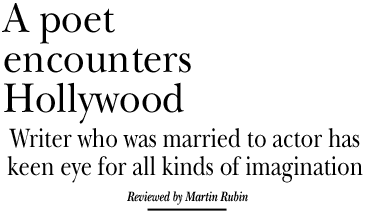
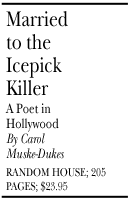 Running
through the book as well is a moving, elegiac subtheme: a deeply felt
tribute to the author's husband David Coleman Dukes, whose sudden, premature
death at age 55 two years ago ended an impressive career on stage
and screen.
Running
through the book as well is a moving, elegiac subtheme: a deeply felt
tribute to the author's husband David Coleman Dukes, whose sudden, premature
death at age 55 two years ago ended an impressive career on stage
and screen.
